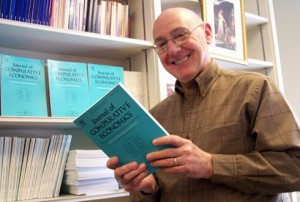Bonin Meets With European Bank Economists

In the midst of the banking crisis affecting the euro, John Bonin found himself in June offering banking advice to two countries that are members of the European Union, but have yet to join the monetary union linked by the euro.
Bonin, the Chester D. Hubbard Professor of Economics and Social Science, professor of economics, gave the keynote address during the Annual Conference of the European Association for Banking and Financial History on June 7. The event was co-sponsored by National Bank of Romania in Bucharest, Romania. The address was titled “Two Decades of Foreign Banking in Emerging Europe: the Devil is in the Details.”
Romania is not yet in the European Monetary Union but its entry has been discussed during the last few years. Still it is likely linked to the European economy and Bonin’s presentation focused on the role of the six large international European banks in the Central and East European economies.
“The banking sectors of these countries have basically been taken over by these foreign banks,” Bonin says. “I traced the role of these banks in the retail credit, including mortgage, booms in the pre-financial crisis period. I then examined the differential responses across countries to the financial crisis and linked this to the structure of their banking sectors.”
Bonin shared the stage with Mugur Isarescu, the Governor of the National Bank of Romania, drawing extensive coverage from the Romanian and European news media.
Bonin said the Romanian media was particularly interested in the commitment of these foreign banks to their country, and his presentation reinforced that the international banks will continue to grow their business in the region. However what the media seemed more interested in asking Bonin about was the euro crisis.
“I was struck by the uniformity of opinion among Romanians, professionals and citizens alike, that the problems faced by Greece and Spain are due to their own negligence and should not be the responsibility of the entire monetary union,” he says. “I discussed the importance of organizing supranational banking institutions such as deposit insurance and supervisory oversight, and the usefulness of euro bond issues to spread the country risk among the members in the monetary union.”
Bonin also met with economists in Hungary and discussed a joint project with Istvan Abel, an economic analyst at the National Bank of Hungary. The project would study the role of entrepreneurship and innovation in promoting exports through the lens of small and medium sized enterprises. View a photo of all conference participants online here.
As part of his meetings, Bonin did discuss the plight of the euro. The Hungarian government is opposed to the idea of an independent central bank. This has made interactions concerning monetary policy between government representatives and the Hungarian National Bank’s policymakers difficult.
“I also asked about the serious mortgage problem in which Hungarian household took out mortgage loans denominated in Swiss francs and found their financing requirements increased considerably when the Swiss franc appreciated with respect to the euro and the Hungarian currency,” Bonin says.
The situation is causing a significant credit problem in the country.
“I learned that the largest Hungarian bank, OTP, which is a domestically controlled bank, issues these mortgages in concert with the international European banks,” he says. “But the solution is not to blame the foreign banks as the current government claims. The problem is not due to the presence of foreign banks but rather to the interest rate differential between mortgages offered in the domestic currency and those offered in Swiss francs.”
In all, Bonin spent more than a week in Budapest meeting with economists at the National Bank regarding the euro fiscal crisis and other factors facing the Hungarian economy.

